Results
-
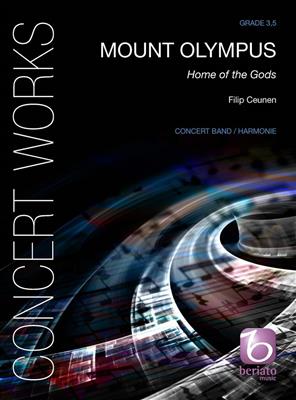 £106.99
£106.99Mount Olympus - Filip Ceunen
Mount Olympus was commissioned by the Groot Genker Orkest from Genk (Belgium) on the occasion of its 20th anniversary. In the context of this composition, Mount Olympus, the home of the Greek gods, can be seen as a reference to the Zwarte Berg (Black Mountain) in Genk, that, with its rolling hills and lush nature, is also a place of inspiration and contemplation - which prompted the composer to write this attractive work, in which various facets of the mythological mountain Olympus are represented.
Estimated dispatch 7-14 working days
-
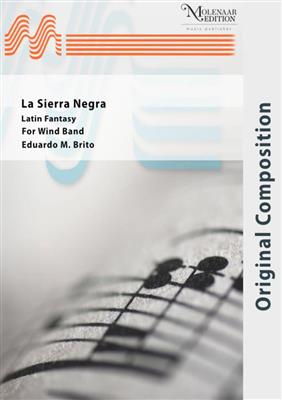 £124.20
£124.20La Sierra Negra - Eduardo M. Brito
The irresistible beauty of Latin American music led Eduardo Brito to write this fantasy. In "La Sierra Negra," we travel through a rich melodic landscape that always balances between the characteristics of traditional Mexican music and the cultural influences of Spanish music."La Sierra Negra" (Black Mountain) is named after an extinct Mexican volcano. The name contrasts with "Pico de Orizaba," a neighboring dormant volcano that is covered with snow year-round and called "White Mountain" by locals.
Estimated dispatch 7-14 working days
-
 £189.99
£189.99The Spell - Oliver Waespi
The Spell is a musical interpretation of an old legend from the Alpstein, a mystical mountain area in the east of Switzerland. According to the tale, a shepherd boy, Hennes, cared for his animals on the alpine pastures, but many of the animals fell ill with a terrible plague and died. The mountain spirit appeared to Hennes out of the mists of Sntis and so the story unfolds... The music of The Spell follows the narrative of this legend, in which musical motifs are assigned to the essential elements of the story, a technique seen in late romantic repertoire by composers such as Wagner or Richard Strauss.
Estimated dispatch 7-14 working days
-
 £35.50
£35.50Triglav - Julius Fucik
Julius Fuc k (1872-1916) appreciated life in Sarajevo. First compositions were written, which soon made him become one of the leading representatives of his profession in Austria-Hungary. Among those works also figured his elaborate piece "Austria's Glory and Honor", which unfortunately remains kind of ill-fated up to now. Yet another area of activities, where Fu k was able to demonstrate his talents was to stage the symphony concerts introduced by him in Sarajevo. Late in fall of the year 1900 Fuc k's time had come, when the regiment deployed from Sarajevo to Budapest. He lived in that metropolis on the Danube for the next some ten years, and during that period most of hisworks were composed. At that time his popularity also grew from day to day. The first performances of his works met with general interest, and not only numerous officers most of them were friends of Fuc k attended these events, they rather were attractions for all ranks of the society. It should also not be overlooked that music publishers were anxious to secure almost each one of his works for their publishing company, and most of them were printed immediately after their premieres. In 1899 the "Laban March" was written as his Opus 44. It was dedicated to Major General Rudolf Laban of Vralje, commander of the 3d Mountain Brigade which was stationed in Nevesinje. The title of the march then changed to "Eiserne Brigade" ("Iron Brigade") until it finally became known as "Danubia". It was first printed as late as 1933 by Bohuslav Leopold (Edition Continental). Leopold was a musician in Fuc k's regimental band, and later a successful publisher. He succeeded in securing the best of Fuc k's works for his company. Sketches of "Triglav" date back to 1903. The title alludes to the highest mountain of the province of Slovenia, and this was probably an apt means in the eyes of the composer to demonstrate his "Slavonic patriotism".
Estimated dispatch 7-14 working days
-
 £82.50
£82.50Creepy Classics For Band - Robert E. Foster
A great way to introduce some of the best-known themes from classical literature in a fun and spooky package! Four of the most haunting classical themes: In the Hall of the Mountain King; The Sorcerers Apprentice; Danse Macabre and A Night on Bald Mountain conjure up images of ghosts, witches, sorcerers and all manner of creepy, spooky creatures. Especially suitable for Halloween concerts, youll want to program this all year round!
Estimated dispatch 7-14 working days
-
 £104.50
£104.50Three Stars Of Tennessee - Gary P. Gilroy
Inspired by the three distinct cultural regions of Tennessee, this three-movement work abounds with flair and creativity. The first movement, Smokey Mountain Jig, salutes the eastern "mountain folk" with an original Irish jig. Movement two, Plantation Sunrise,is a beautiful ballad for the central region. Movement three, Johnny on the River, reflects life in western Tennessee as it depicts the vivacious business and social life on the river. A wonderful work!
Estimated dispatch 7-14 working days
-
 £149.99
£149.99Sierra Nevada - Philip Sparke
Sierra Nevada presents the listener with the wondrous grandeur of one of the great mountain ranges in California, U.S.A., the Sierra Nevada. Experience the awakening of an early morning in the Sierras, complete with a mysterious, foggy mist, totally obscuring any hint of what lies within, to the tremendous panorama of grand snow-covered mountain peaks and the circling golden eagles, the regal elk and royal stags. A wonderfully descriptive work that will fit well into any concert program.
Estimated dispatch 7-14 working days
-
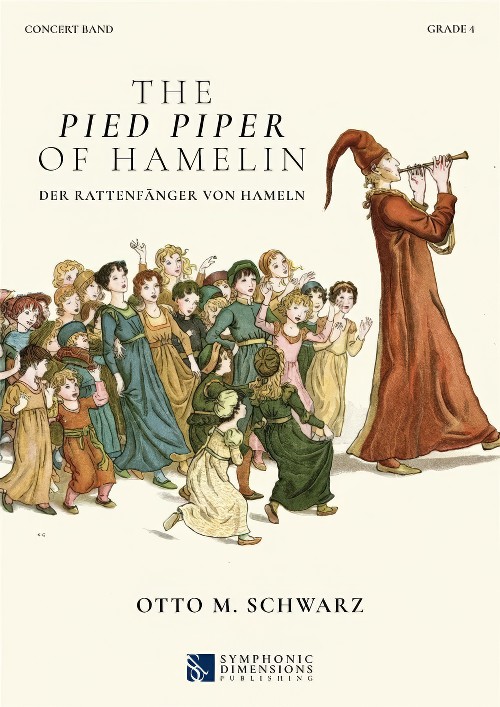 £163.99
£163.99The Pied Piper of Hamelin (Concert Band - Score and Parts) - Schwarz, Otto M.
Stories, sagas and legends--who among us don't know them? Always delivered with a tinge of brutality, these cautionary tales are a legacy of moral education from times past: inquisitive children alone in the forest are generally eaten by a witch; the 'Soup-Kasper' of Hoffmann's Struwwelpeter dies from starvation rather than eating his soup; anyone letting in strangers usually gets devoured; anyone who plays with matches gets burned; and thumb-suckers get their thumbs cut off. The list of unfortunate demises is almost endless.In the tale of The Pied Piper of Hamelin, parents lose their children through greed, ridicule, scorn and a failure to appreciate art. There is still a street in the town of Hamelin in which neither drumming nor playing has not been allowed since 130 children disappeared into a mountain, never to be seen again. This composition by Otto M. Schwarz opens with exactly this scene, taking us back to the year 1284. As in many towns at the time, Hamelin in Germany suffered with hygiene problems--rats and mice began to multiply rapidly, and the town was overrun with the plague. There appeared a man dressed in colourful clothes who promised the locals to free them from this burden. They agreed and settled on a fee. Then the man pulled out a pipe and began to play. When the rats and mice heard this, they followed him. He led the animals into the Weser River, where they all drowned. Back in town, the people refused to pay him. They didn't recognise this man's skills and knowledge and were only prepared to pay for simple labour. A pact with the devil was made, which led to the Pied Piper leaving the town in a furious rage. One Sunday, when many people were at church, he returned, took out his flute and began to play. The town's children were so enchanted by his playing that they followed him. He led them out of the town and disappeared with them forever into a mountain forever. Of all the children, only two survived--however one was mute, and one was blind. In the street from which the children left Hamelin, music may no longer be played in memory of this event. The work may be performed in two different versions: 1. Purely instrumental (without narrator)--the GPs (pauses) must be kept short 2. With narrator--he speaks in the GPs but not during the music.Duration: 14.15
Estimated dispatch 7-14 working days
-
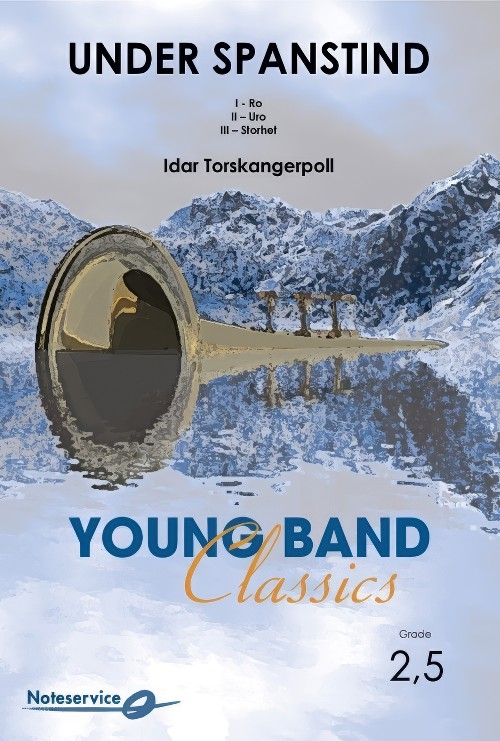 £85.00
£85.00Under Spanstind (Concert Band - Score and Parts) - Torskangerpoll, Idar
Suite in Three MovementsThis piece of music is a commissioned work for Lavangen School band and their band music convention in 2019. The piece was performed under the mountain Spanstind (located far north in Norway) by a band consisting of approx 400 amateur musicians. The mountain Spanstind is 1457 meters high and drops into the valley Spansdalen below, an especially scenic venue.The composition is inspired by the sami joik (folk song) Ru?gu?ohkka, the song to Spanstinden. It is also inspired by the nature of the surroundings. Mvt 1 "Ro" (calmless) describes the feeling of calmness in the midnight sun. Mvt. 2 "Uro" (unrest) describes a scene of wind, snow, avalance and the big forces of nature. Mvt 3 "Storhet" (greatness) describes the feeling of greatness the nature has, and how we experience it as majestic and exalted.The piece can be played with the movements alone, or one can add the signals played by soloist(s) off-stage or in the back of the hall. The signals are to be played before, in between, and after the 3 movements. All instruments can be soloists. The soloist performs the signals rhythmically aleatoric, where each soloist repeats the signal 4 times in his or her own tempo. Signal 1 is played before Mvt 1, signal 2 is played between Mvt 1 and 2, signal 3 is played between Mvt 2 and 3, and signal 4 is played while the band holds the last note (long, use stagger breathing). after a while, all the soloists end on the same note and the music fade out.Duration: 6.30
Estimated dispatch 7-14 working days
-
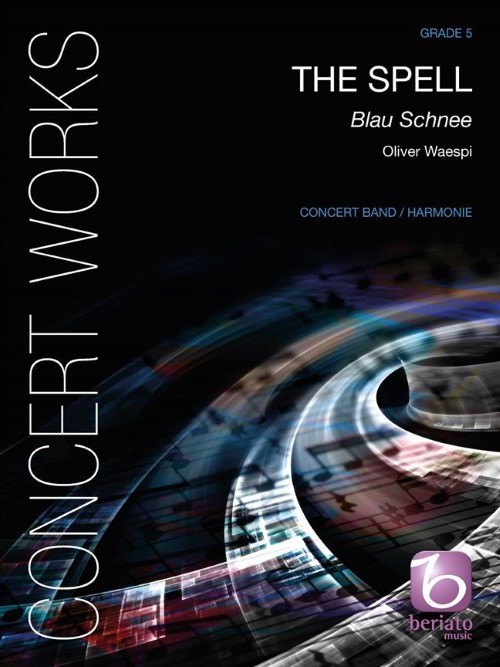 £189.99
£189.99The Spell (Concert Band - Score and Parts) - Waespi, Oliver
The Spell is a musical interpretation of an old legend from the Alpstein, a mystical mountain area in the east of Switzerland. According to the tale, a shepherd boy, Hennes, cared for his animals on the alpine pastures, but many of the animals fell ill with a terrible plague and died. The mountain spirit appeared to Hennes out of the mists of Santis and so the story unfolds... The music of The Spell follows the narrative of this legend, in which musical motifs are assigned to the essential elements of the story, a technique seen in late romantic repertoire by composers such as Wagner or Richard Strauss.Duration: 13.00
Estimated dispatch 7-14 working days
